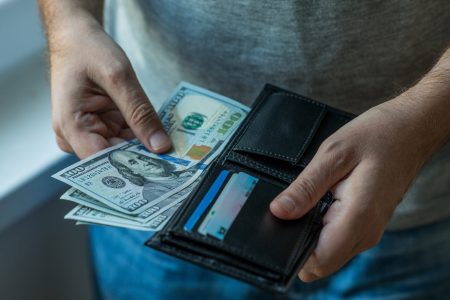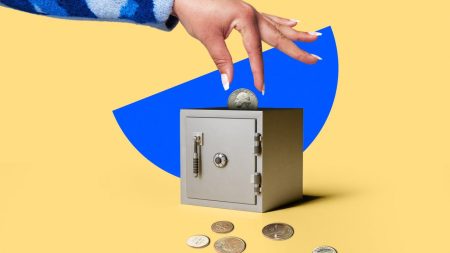Key takeaways
- Personal loans can be an excellent tool to consolidate debt and simplify your bill-paying schedule to avoid credit-damaging missed payments.
- The installment nature of personal loans can be aligned with other financially freeing goals since the payments don’t change.
- Because most personal loans are unsecured, you avoid borrowing against wealth you’ve built in your home and car.
- Paying off revolving debt with personal loans could have a ripple effect on the cost of future credit and insurance products.
Bankrate’s latest Financial Freedom Survey found that over 77 percent of U.S. adults don’t feel financially secure. That number has ticked up steadily since 2023 as salaries failed to keep up with a rapid spike in inflation.
Many financial influencers consider debt an enemy of financial freedom, but for most people, it’s unavoidable. Personal loans often get lumped into the same class as payday loans, yet TransUnion data shows that more borrowers with excellent credit are turning to them for funding.
Could personal loans help restore some of that security and put Americans on a path to financial freedom? The answer to that question starts with an honest look at what’s stressing financial households the most and seeing how personal loans stack up as a solution.
What is financial freedom?
Bankrate managing editor and certified financial planner (CFP) Hanna Horvath offers this definition:
Financial freedom is a state where you have complete control over your finances, allowing you to make choices based on your desires and goals rather than being limited by how much things cost.
— Hanna Horvath, CFP, Bankrate managing editor
With that definition in mind, it might seem that debt gives away control of your finances to a lender you have to pay back. While that is true, for most Americans, debt is necessary:
- Student loans are common to fund a college education.
- Car loans help you spread out the cost of reliable transportation.
- Mortgages allow you to finance the cost of a home for 30 years.
While home loans and auto loans have a direct correlation to wealth-building and financial freedom, other types of debt, like personal loans, may have more indirect pros and cons to improve your money future.
What you need to learn – and unlearn – about personal loans
Relying heavily on other types of debt, especially credit cards, is creating real obstacles to financial freedom for many Americans, according to a recent Bankrate credit utilization survey
Americans aren’t using personal loans as much as credit cards despite the following facts:
Myths surrounding personal loans
Personal loans are arguably one of the most misunderstood – yet potentially beneficial – loan product in the lending world. You probably know someone who has a credit card, a mortgage or a car loan. Personal loans? Not so much.
Bankrate editor Katie Lowery was skeptical about personal loans because she knew very little about them. “In fact, I believed that personal loans were a scam or a rip-off, something akin to a payday loan,” Lowery says.
Now that she’s become educated about how they work, she gives them a thumbs up as a credit alternative:
They’re superior to credit cards in many ways – fixed payments, predictable payment schedule and potentially lower rates.
— Katie Lowery, Bankrate editor, Loans
So where do these misperceptions come from? The answer may lie with the spread of three common myths about personal loans:
1. You need stellar credit to qualify
Just about every personal loan myth-busting article dispels the notion that these loans are only for the credit score elite. Many personal loan lenders even cater to bad credit borrowers.
2. The rates are sky-high
Another personal loan myth compares personal loan rates to payday loan rates. Most personal loan lenders cap their APRs at 35.99 percent or lower while payday loan APRs can run up to 400 percent APR (or higher).
3. You can only use them for emergencies
Although the fast approval and funding speed of personal loans make them handy for emergencies, they can be used for home improvement projects without reducing your home’s equity or consolidating debt as part of a long-term credit score improvement strategy.
How personal loan financial math can set you financially free
Personal loans are a valuable financial tool because it’s an installment loan, meaning your payments are the same every month until the loan is paid in full.
Unlike revolving debt like credit cards, you can’t reuse the amount you borrowed as you pay it off. You know your payoff date will be one to seven years in most cases. With revolving debt – you could be paying for decades making the minimum payment.
This is important for two major reasons when it comes to financial freedom:
- Payments you make on debt offset any gains you make on investments: The average return on an S&P 500 index fund is 10 percent. The average rate on a credit card is 20 percent. Every month carrying a credit balance reduces the return on your cash investments.
- Carrying balances could cost you more on other debts: A higher credit utilization ratio leads to lower credit scores. That could impact a 30-year mortgage rate for a home purchase, a five-year auto loan rate and a 20-year private student loan rate.
Let’s say Jack has $10,000 worth of maxed-out credit card debt with an average rate of 20 percent. He can do one of two things:
- Continue making the minimum payments
- Take out a $10,000 personal loan to improve his score from fair to good at a 17.9 percent rate and a five-year term
| Loan results | Payment minimum on credit card | Consolidates credit cards with personal loan |
|---|---|---|
| Monthly payment | $250 | $315.83 |
| Total interest paid | $14,423.16 | $3,635.53 |
| Time to pay off | 342 months | 60 months |
How the personal loan contributes to Jack’s financial freedom
- The $10,000 balance will be paid in full within five years compared to 28.5 years on the minimum credit card payment.
- Jack will have more than $3,700 per year to invest in retirement or education funds, save for a down payment or pad his emergency savings after 60 months.
- Jack will save over $10,700 in interest charges.
4 ways personal loans can help you achieve financial fluency
The example above shows how much interest someone can save from a debt consolidation loan rather than carrying credit card balances. It’s also an example of financial fluency in action.
You may have heard of financial literacy, which gives you a basic understanding of financial tools and concepts like budgeting and credit scores. Financial expert Bernadette Joy says that literacy isn’t enough in the article “Financial literacy is dead.”
“I like to compare financial literacy to playing basketball,” she says in the article. “Just because you’ve learned the rules and even studied the playbook doesn’t mean you’ll know how to maneuver during critical times in the game.”
Here are a few slam dunks worth mentioning to help you win the financial freedom game:
1. Reap credit score benefits from paying off credit card debt
Paying off credit card debt with a debt consolidation loan can be a powerful financial tool. Not only does it reduce the risk of missing a payment since you’re tracking too many debts, but the drop in your credit utilization ratio could meaningfully improve your credit score. That could lead to:
- Lower rates on a 30-year mortgage
- Lower premiums on your homeowner’s insurance
- Better rates on your car loan and car insurance
- Reduced monthly expenses and more discretionary income for investing
Best debt consolidation loans
Curious about debt consolidation? Want to see what rates lenders are offering? Bankrate has a list of the best lenders to check out.
Check rates now
2. Avoid tying up equity with loans secured by your assets
Most personal loans are unsecured, which means you don’t need an asset for approval. Examples of secured loans are home and auto loans. Every dollar you borrow on a mortgage or car loan reduces the amount you’ll net if you want to – or have to – sell it.
3. Prevent potential loss of shelter or transportation
When you borrow money secured by your home or a car, you give the lender certain rights to foreclose on your home or repossess your vehicle if you default on the loan. The loss of a home to foreclosure or a car to repossession could have devastating consequences on your path to financial freedom.
For instance, the repercussions of a foreclosure on your credit score can last for years. You could end up building equity for the owner of a home you rent rather than in the one you own. Not having reliable transportation could also limit your access to job opportunities. It may also require you to reallocate funds for investing to pay for public transportation or rideshare expenses.
4. Buy older, cheaper used vehicles
With car prices remaining stubbornly high, you may be looking at higher mileage in older model cars. The fast funding timelines for personal loans gives you the ability to compete with cash buyers if a good deal comes along.
Filtering out the noise to make a financially sound borrowing choice
As soon as you start searching for any type of credit, one thing is for sure: you’ll be inundated with information from every direction. Personal loans may help you to filter out the noise and sales spin of some popular and heavily marketed credit products.
Bankrate principal writer Sarah Foster, who warned that tethering yourself to the 24-hour financial news cycle could trigger emotionally-driven and even harmful money moves.
If you’re following financial news and using it as a justification for adjusting your strategy, essentially you’re opening yourself up to maybe making an irrational decision…[which] could hurt you in the end.
— Sarah Foster, Bankrate principal writer
A few things to remember as you navigate the personal loan landscape and the marketing pitches for their alternatives:
- Don’t fall for the 0 percent balance transfer card pitch: A balance transfer card is still a credit card with credit-utilization-ratio spiking potential. Although the APR may be 0 percent, you’ll typically pay 3 percent to 5 percent in transfer fees.
- Arm yourself with knowledge to resist sales spin tactics: Personal loans are a no-frills debt product. They don’t come with “at-check-out” discounts, freebie gifts for opening or initial cash-back rewards. As a former debt dealer, I can tell you this with 100 percent certainty – every freebie comes with a cost.
- Your credit score – not the economic news – drives your rate: As your credit score improves, you can replace higher rate bad or fair credit loans with good or excellent credit loans. You have more power than the Federal Reserve does to get the lowest rate on a personal loan by constantly taking steps to improve your credit score.
Final thoughts about personal loans and your financial future
A personal loan can be a tool for rescue, repair or reset: it could rescue you from the risk of a late payment by consolidating several credit cards into one easy-to-remember payment, it can repair the effects of too much revolving debt, and it can reset your credit payoff clock with a fixed term of one to seven years. It can be a one-way ticket off the credit card merry-go-round to a straight installment path to debt freedom.
It’s important to be flexible when it comes to any financial plan. An unexpected layoff, an emergency home or medical expense, or even a sudden change in the economy can lead to impulsive panic decisions. Maybe you have already made some financial decisions you regret. The good news is, you can always start making the right ones now.
Why we ask for feedback
Your feedback helps us improve our content and services. It takes less than a minute to
complete.
Your responses are anonymous and will only be used for improving our website.
Help us improve our content
Read the full article here












